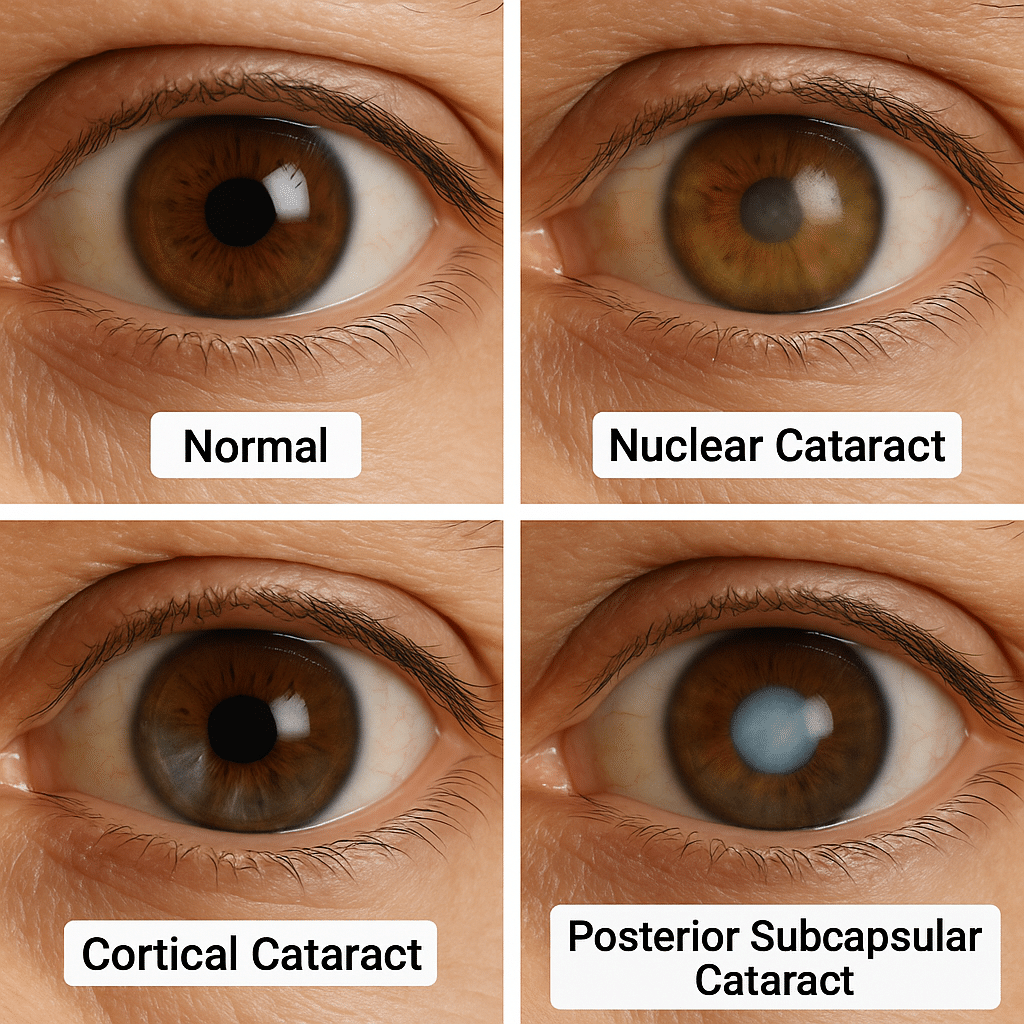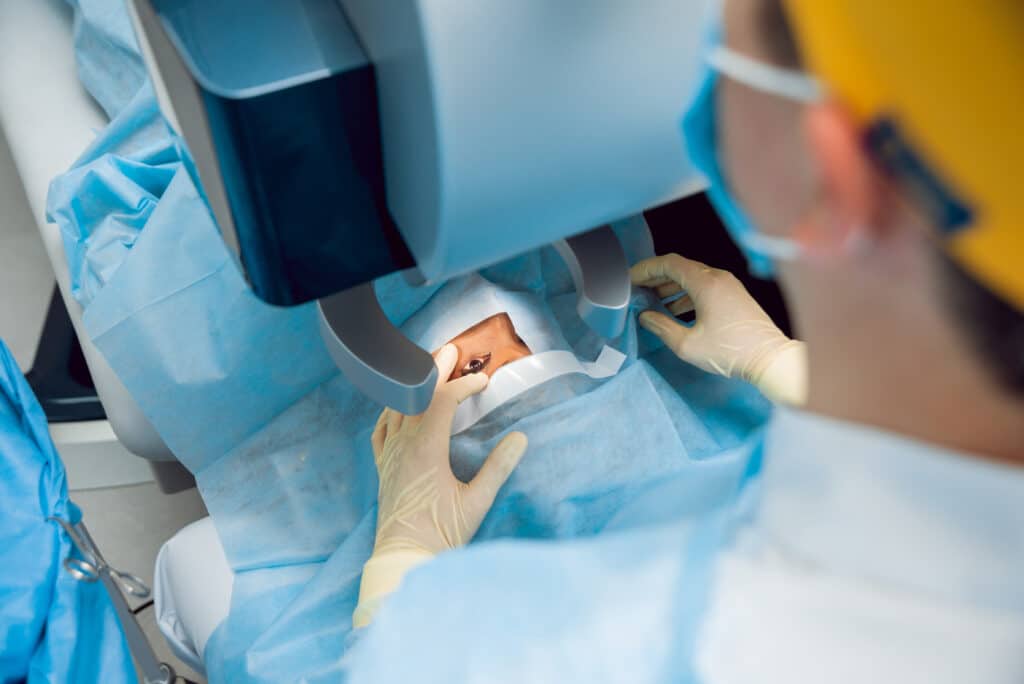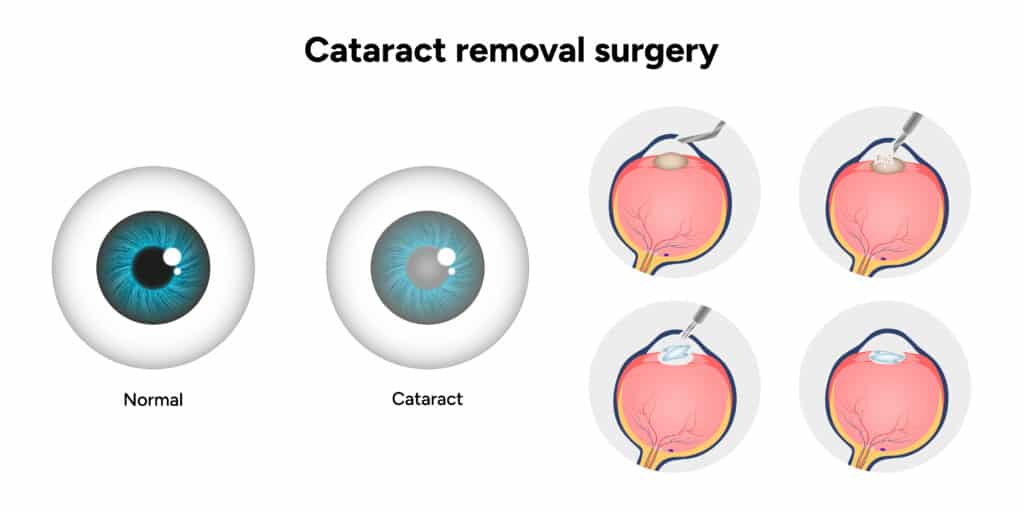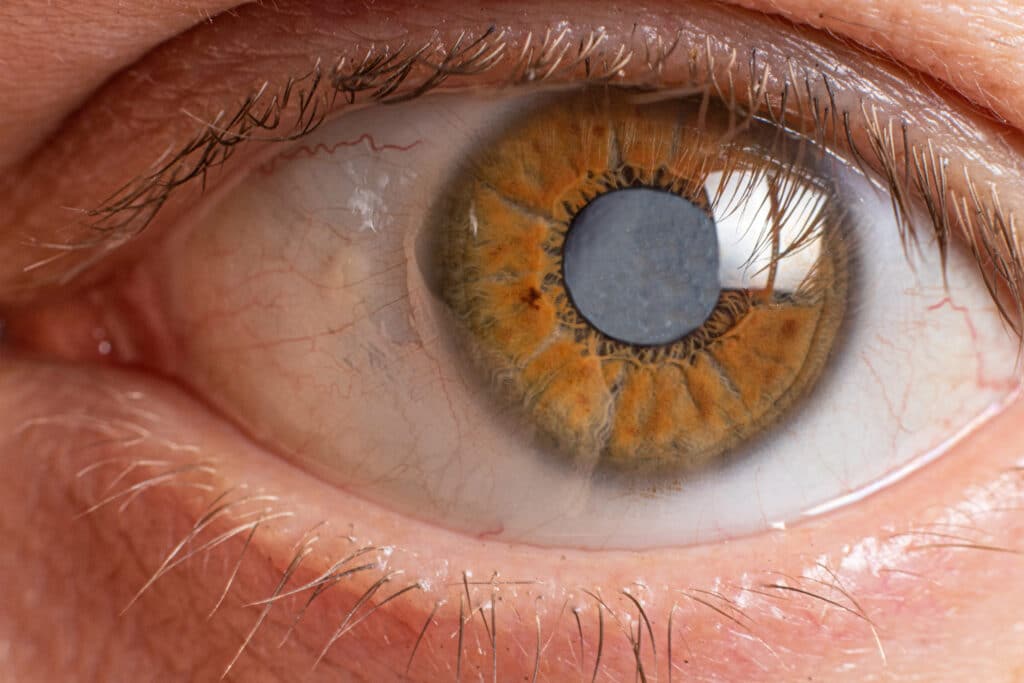Choosing the right time to get cataract surgery could make a huge difference to your eye health. This surgery ranks as the UK’s most common operation. Doctors perform over 400,000 procedures each year in England alone. The surgery has a great track record of improving eyesight, but many patients aren’t sure about the best time to take this vital step.
The best time to remove cataracts is clearer than you’d expect. Your eyesight will keep getting worse as the cataract grows, and most people will need surgery eventually. Putting it off too long can cause major problems. Untreated cataracts can cause eye inflammation and raise eye pressure, which might lead to glaucoma. Vision loss or blindness can happen too. On top of that, cataracts get thicker, darker and denser with time. This makes the surgery trickier and means you’ll take longer to recover.
Spotting cataracts early leads to the best results. Eye doctors strongly suggest removing cataracts while they’re still in early stages. This makes both the surgery and recovery much easier. To know if it’s time to see a doctor, ask yourself some key questions. Can you drive safely? Do you see road signs clearly at night? Your answers might tell you it’s time to get a full eye check.

How cataracts develop and why timing matters
Your eyes start developing cataracts way before you notice any changes in vision. A better understanding of this slow process will help you decide the best time to get treatment.
How long do cataracts take to develop?
The lens in your eyes begins to cloud around age 40. Proteins break down and start clumping together at this stage. You might not notice any symptoms until you reach your 60s or later. Many people experience this silent phase that lasts more than a decade. Age makes cataracts more common. One in five people aged 65 to 74 have vision-affecting cataracts. The numbers rise sharply – more than half of those over 80 either live with cataracts or have had surgery to remove them.
Cataracts move through four stages—early, immature, mature, and hypermature. Your lens stays mostly clear during the early stage with minimal effects on vision. The immature stage shows more symptoms as proteins group together, which can get in the way of daily tasks.

How quickly do cataracts progress once symptoms appear?
Each person’s cataracts progress at different rates. Research shows that within a year, nuclear cataracts advance in 42% of cases, cortical in 32%, and posterior subcapsular opacities in 10% of cases.
Some things can make cataracts grow faster. Diabetic patients often develop cataracts more quickly. Smoking, too much alcohol, long UV light exposure, and certain medicines like corticosteroids can speed up the process. Watch out for signs of faster-growing cataracts. These include needing new glasses often, seeing more glare around lights (especially at night), and trouble seeing in dim conditions.
Also Read: Cataract Surgery Recovery: When Can You Safely Return to Daily Activities?
Why early detection is key
Finding cataracts before they affect your vision too much has clear benefits. Your eye doctor can track changes and suggest the right treatment at the perfect time. Cataracts found early are usually easier to remove. They become dense and harder to treat if left too long. This makes surgery more complex and recovery slower. Quick action leads to better results after surgery, fewer complications, and faster healing. Regular eye checkups help doctors spot the first signs of cataracts. They can catch problems before your vision starts to suffer.
Warning signs you may be waiting too long
Understanding the warning signs of cataracts plays a vital role in determining the right time for cataract surgery. Your awareness of these symptoms helps prevent complications from delayed treatment.
Blurry or cloudy vision
Blurry or cloudy vision stands out as the most common cataract symptom that gets worse over time. The cloudiness might affect just a small part of your eye’s lens at first, leading to minimal vision loss. The cataract grows larger, and your vision becomes more foggy, filmy, or cloudy—like looking through a frosted window. Reading and recognising faces become harder as a result.

Difficulty seeing at night or in low light
Declining night vision often signals the earliest stage of cataract development. Driving after sunset becomes more challenging as streetlights look hazier and headlights create sharper glare. This happens because cataracts scatter incoming light, which reduces contrast and makes dim conditions harder to navigate. This symptom can affect your quality of life and safety significantly.
Frequent changes in glasses prescription
Needing new glasses or contacts more often than usual might point to cataracts. Some people notice their near vision improves early in cataract development—doctors call this “second sight”. Vision typically gets worse as the cataract grows, which means you’ll need regular prescription updates.
Increased sensitivity to light and glare
Bright sunlight, headlights, or indoor lighting often cause discomfort when you have cataracts. Light sensitivity happens more frequently in people with posterior subcapsular cataracts. Simple activities like spending time outdoors on sunny days or shopping in bright stores can become uncomfortable.
Seeing halos around lights
Bright circles around light sources—called halos—signal another clear sign of cataracts. These appear because your clouded lens breaks up incoming light. Night driving becomes more dangerous as these halos show up around streetlights and oncoming headlights.
Faded or yellowed colours
Colours start looking duller, more faded or yellowed as cataracts progress. Your colour perception changes because cataracts can develop a brownish or yellowish tint. Darker shades like blues and purples become harder to tell apart.
Clear, safe vision shouldn’t wait—book your consultation with Precision Vision London today to take the first step toward better sight.
Risks of delaying cataract surgery

Delaying cataract surgery when you need it can lead to serious complications that affect your vision and overall health. You need to understand these risks to decide the right time for cataract surgery.
Longer and more complex surgery
Dense and harder cataracts develop as they mature. Even the most skilled surgeons find these procedures challenging. Your surrounding eye structures might get damaged because breaking down and removing a hardened cataract needs more energy. You might face complications like wound burns, rupture of the capsular bag, and longer surgery time.
Slower recovery and higher complication risk
Advanced cataract surgery recovery takes 2-3 weeks—much longer than standard procedures. Your risk of post-operative complications goes up with delayed surgery. These include high eye pressure and corneal oedema. You might need extra treatments and appointments that make your recovery time longer.
Increased risk of falls and accidents
Your risk of falls and accidents goes up with untreated cataracts. Research shows people with cataracts face 36% more falls than those without. The risk of fractures rises by 28% in people with untreated cataracts. Studies reveal that cataracts and poor vision caused 60% of fractures in older adults.
Potential for permanent vision loss
Complete vision loss can happen if cataracts remain untreated. Your eye might develop inflammation and increased pressure as cataracts progress. These conditions need emergency care to prevent permanent blindness. Cataracts are the leading cause of blindness worldwide, but timely surgery can prevent this outcome.
Effect on treatment of other eye conditions
Other serious eye conditions might go unnoticed behind advanced cataracts. Mature cataracts make it harder to manage conditions like glaucoma and macular degeneration. Eye specialists struggle to monitor and treat these diseases properly. Don’t let your vision become dangerous—book your consultation with Precision Vision London today for clearer, safer sight.
Why early surgery at Precision Vision London makes a difference
Choosing the right time for cataract surgery works hand in hand with selecting the right clinic. Precision Vision London combines early intervention with innovative technology to create optimal outcomes for your vision health.

Advanced diagnostic tools for early detection
Precision Vision London uses state-of-the-art diagnostic equipment to identify cataracts before they affect your vision. Our advanced Technology measures your eye with exceptional accuracy, which helps our specialists determine the best implant power for you. We perform a complete corneal analysis to measure astigmatism and assess your eye’s unique optical requirements. These detailed assessments enable earlier detection and precise surgical planning.
Minimally invasive techniques for faster recovery
Our surgeons use modern micro-incision techniques to remove cataracts through tiny 2mm self-sealing incisions. This keyhole approach eliminates stitches and speeds up recovery substantially. Experienced surgeons complete the procedure in just 10-15 minutes under topical anaesthetic—using only drops to numb the eye. Most patients see clearly within 1-2 days after surgery because of this minimally invasive approach.
Customised lens options for your lifestyle
Precision Vision London offers more options than the standard NHS service, with access to advanced intraocular lens technologies. These include:
- Multifocal/trifocal lenses for clear vision at multiple distances
- Toric lenses to correct astigmatism
- Light Adjustable Lenses that can be customised after surgery
Light Adjustable Lenses represent a breakthrough technology. Our specialists can design, test and customise your vision even after completing the surgery.
Trusted UK surgeons with years of experience
Fellow doctors choose our consultant ophthalmologists for their expertise, ranking them among the UK’s leading cataract specialists. Our surgeons maintain exceptionally low complication rates after performing thousands of successful operations. They remain at the vanguard of new surgical techniques, giving you access to the most advanced procedures available.
Personalised care from consultation to recovery
Better outcomes stem from personalised care at Precision Vision London. Our team provides complete support tailored to your specific needs from your original consultation through post-operative follow-up. We create a custom treatment plan using advanced diagnostic tools by understanding your visual challenges and lifestyle priorities.
Conclusion
Getting cataract surgery at the right time will shape your vision health for years to come. Cataracts take years to develop before you notice any symptoms. But once these signs show up, quick action becomes vital. The risks go well beyond just feeling uncomfortable – you might need more complex surgery, face longer recovery times, have a higher chance of falling, and could lose vision permanently.
Precision Vision London gives you clear advantages with early treatment. Our state-of-the-art diagnostic tools catch cataracts early when they’re easiest to treat. The minimally invasive surgery we use helps patients see clearly just 1-2 days after the procedure. Your treatment plan includes custom lens options that match your specific lifestyle and vision needs.
Our consultant ophthalmologists rank among the UK’s top cataract specialists. Their expertise combined with personalised care will give a unique experience with exceptional results. While cataract surgery remains the UK’s most common operation, Precision Vision London stands out because of our state-of-the-art technology and individualised treatment approach.
Your vision is too important to wait until it becomes dangerous. Book your consultation with Precision Vision London today to take the first step toward clearer, safer eyesight. Your vision deserves the best care possible, right when you need it most.
FAQs
Q1. What are the risks of delaying cataract surgery? Delaying cataract surgery can lead to more complex procedures, longer recovery times, increased risk of falls and accidents, and potential permanent vision loss. It may also complicate the treatment of other eye conditions.
Q2. How long does it typically take for cataracts to develop? Cataracts usually begin to form around age 40, but noticeable symptoms often don’t appear until one’s 60s or later. The development process can span a decade or more for many people.
Q3. What are the early warning signs of cataracts? Early signs include blurry or cloudy vision, difficulty seeing at night, increased sensitivity to light, seeing halos around lights, and faded or yellowed colours. Frequent changes in glasses prescription can also indicate cataract development.
Q4. How quickly can I expect to recover after cataract surgery? With modern minimally invasive techniques, most patients can see quite well within 1-2 days after surgery. However, full recovery may take a few weeks, and this period can be longer if surgery is delayed until cataracts are more advanced.
Q5. What advantages does early cataract surgery offer? Early cataract surgery typically results in easier removal of the cataract, lower risk of complications, faster recovery, and better overall outcomes. It also prevents the potential worsening of vision and associated risks like falls and accidents.
Authors & Reviewer
-
 Olivia: Author
Olivia: AuthorHi, I'm Olivia, a passionate writer specialising in eye care, vision health, and the latest advancements in optometry. I strive to craft informative and engaging articles that help readers make informed decisions about their eye health. With a keen eye for detail and a commitment to delivering accurate, research-backed content, I aim to educate and inspire through every piece I write.
-
 Dr. CT Pillai: Reviewer
Dr. CT Pillai: ReviewerDr. CT Pillai is a globally recognised ophthalmologist with over 30 years of experience, specialising in refractive surgery and general ophthalmology. Renowned for performing over 50,000 successful laser procedures.

